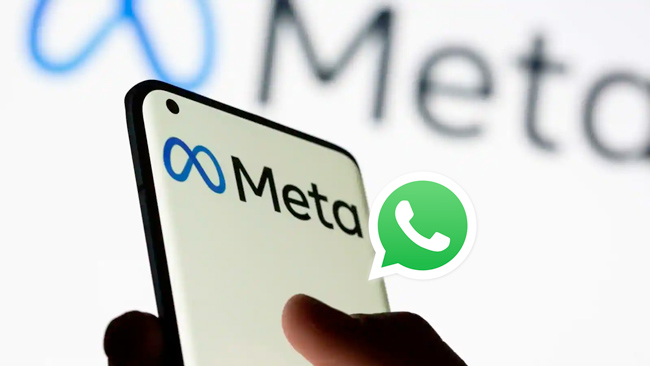After Facebook announced this week that the brand that will gather Facebook itself, Messenger, WhatsApp, Instagram, and more will be called Meta, the company is now changing the footer of its apps to reflect that.
WhatsApp from Meta
with version 2.21.220.14 of WhatsApp beta, when you open the app, it doesn’t show “WhatsApp from Facebook” anymore and it now reflects “WhatsApp from Meta.”
About a year ago, WhatsApp added the “from Facebook” brand when opening the app and it’s now changing that to reflect its goals of being a metaverse company.
WhatsApp also removed the “WhatsApp from Facebook” footer in the settings as well.
When Mark Zuckerberg announced this change alongside its plan for a billion users in its metaverse in a decade from now, he said:
As part of this, it’s time for us to adopt a new company brand to encompass everything that we do. To reflect who we are and what we hope to build. I’m proud to announce our company is now Meta.
Still talking about small WhatsApp updates, this beta also brings the ability to rate messages received from business accounts.
According to WABetaInfo, “WhatsApp has developed this feature to help businesses improve their messages to customers. This means that they could be able to see general feedback about rated messages, but they cannot see who rated them and WhatsApp cannot see the content of the message. WhatsApp is using this technique to preserve your privacy, so the end-to-end encryption.”
related :
Chan Zuckerberg Initiative to sunset its Meta project
The organization confirms it transferred brand assets of its biomedical research project to Facebook before that company’s rebrand.
The Chan Zuckerberg Initiative, a foundation established by Facebook CEO Mark Zuckerberg and his wife, Priscilla Chan, said Thursday that it will sunset its biomedical research project called Meta next year. The news came right after Zuckerberg announced the formation of a new parent company for Facebook called Meta.
Brand assets from Meta were transferred to Facebook following the foundation’s decision to deprioritize the project, according to Jeff MacGregor, the vice president of communications for science at CZI.
He added that the terms of the agreement are confidential.
“Earlier this summer, the Chan Zuckerberg Initiative made the decision to deprioritize the development of Meta in order to focus our efforts on three key priority areas where we believe our Science Technology team can make an outsized impact: imaging, single-cell biology, and infectious disease,” MacGregor said.
The Chan Zuckerberg Initiative made the Meta project public in 2019. According to its site, “Meta is a biomedical research discovery tool that analyzes & connects millions of scientific outputs to give you a comprehensive view into science.” Support for the project will continue until March 31, 2022.
Zuckerberg broke the news of the company’s new name Thursday during Facebook Connect 2021, a virtual-reality-focused event. Meta will be the parent company for Facebook, Instagram, WhatsApp and Facebook’s virtual and augmented reality assets.
The Metaverse Is Mark Zuckerberg’s Escape Hatch
When Mark Zuckerberg appeared onscreen at Facebook’s virtual Connect conference on Thursday, smiling as he wandered through sterile rooms filled with midcentury modern furniture, he looked like a man unburdened.
Whistle-blower? What whistle-blower? Cascading, yearslong trust crisis that has regulators fuming, employees bailing and lawmakers comparing Facebook to Big Tobacco? Hmm, doesn’t ring a bell.
Instead, Mr. Zuckerberg and his lieutenants cheerfully laid out their vision for the so-called metaverse, the immersive virtual environment that Facebook — which, as of Thursday, has been renamed Meta, although everyone except for a few professionally obligated financial journalists will probably keep calling it Facebook — is trying to build.
